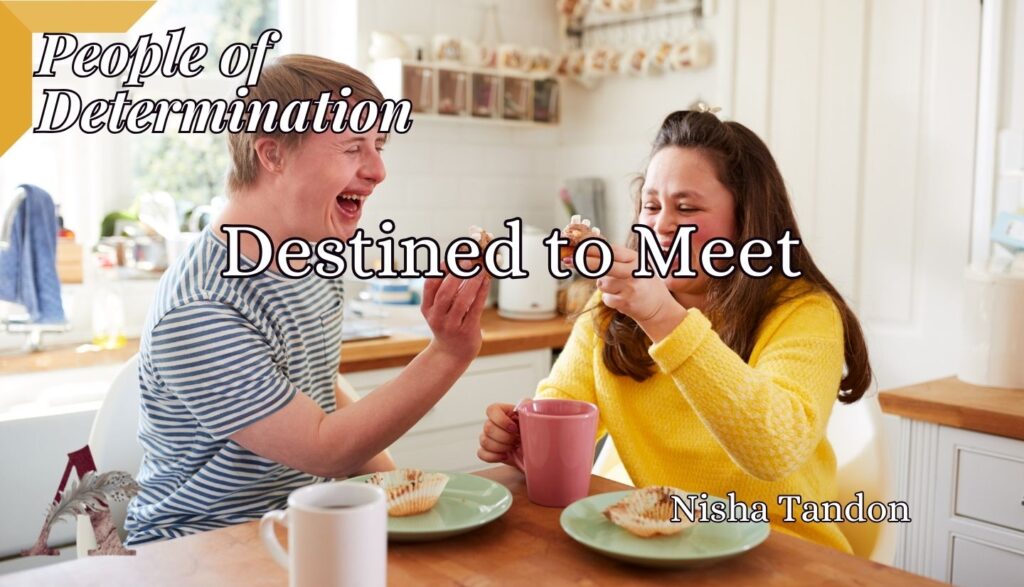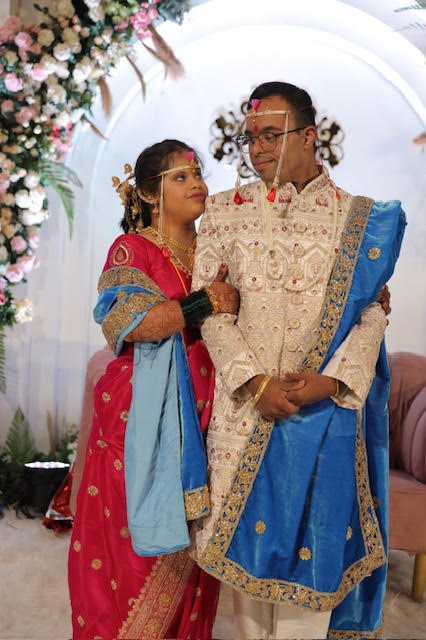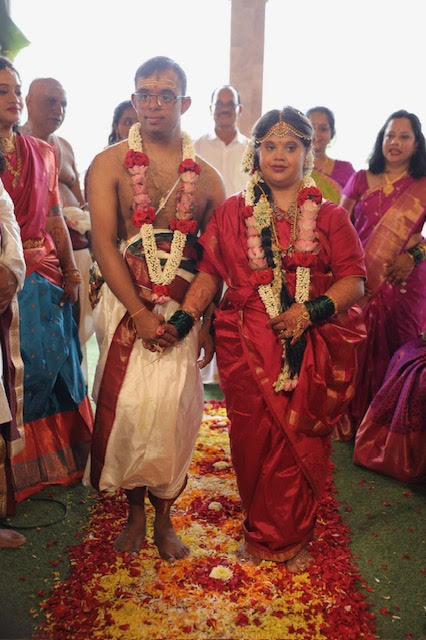
In the words of Rodrigo Duterte, “Destiny is not designed by mere mortals like us. It is crafted by God.”
This stands true for the union of Vignesh and Ananya. Their match was truly made in heaven. It is not always two perfect people that come together to make a perfect life, in this case two imperfect people (so to say) came together for their “happily ever after.”

Veena Vishwanath fondly talks about her family of five, that includes her husband, their daughter who is pursuing medicine in the UK, their son and now a new addition in the family, their daughter-in-law, Ananya. Veena’s husband Vishwanathan is a finance professional and works in a private company in Dubai, whereas she is a busy homemaker. Vignesh and Ananya are employed in the hospitality industry, where Vignesh works in the Front Office Department at Sofitel the Palm, and Ananya works as a Child Minder at Retreat the Palm.
When asked what prompted her to get her son who is diagnosed with Down Syndrome married when the main concern of every special need parent is their independence and capability to sustain, Veena proudly mentions that the idea was mooted by her daughter who was part of a group called Inclusive Matrimony on Facebook. She posted her brother’s profile seeking a good friend or companion for him. In response to that, she received an enquiry from Ananya’s mom if Vignesh would be interested in getting married. This set the ball rolling as Vignesh too showed interest since his friends were all settling down in marital bliss. They, as a family, respected his feelings and decided to pursue the matter. Ananya’s parents were very keen on going ahead with this alliance. At their first meeting, the way the children responded to each other, both the families were convinced that this would be an ideal match.
Since I am a mother of a Down Syndrome daughter, this really interested me, and I delved deeper. I was concerned that it could be a gamble they played. It is tough to raise a child with special needs and taking responsibility for another child with specific needs would double their commitments. When I conveyed the same to Veena, she said more than a gamble or a risk, it is a long-term responsibility. Ananya and Vignesh are quite similar in most of their behaviors, and they felt managing her would be easy barring, of course, dealing with the emotional quotient as she would be miles away from her parents, in a foreign land. Also, like Vignesh, Ananya too is a high functioning down syndrome, and they had full assurance and support from Ananya’s parents who considered this alliance as a collective responsibility. Moreover, Veena treats Ananya like her daughter and there is no difference between the techniques she adapts to deal with tantrums, whether it is Ananya or Vignesh.
I was keen to know how did Vignesh and Ananya meet, and what helped them to get married. To this Veena responded that first both their families met in Mahabalipuram. As soon as they met, Ananya held Vignesh’s hands and walked towards the seashore, turned on the music and they danced together. To their surprise, things were moving too fast. The next day they decided to go to a coffee shop for a date. They liked each other’s company and after returning to Dubai, Vignesh and Ananya stayed connected regularly through video calls. Truly telecom played a significant role in strengthening their bond, like they say, “Distance makes the heart grow fonder,” it did in their case.
Veena continues that in October 2022 when they visited Ananya’s parents in Pune, they firmed up the marriage plans. Later in December 2022, they had an engagement ceremony as they exchanged rings, followed by their wedding in July 2023. Their marriage culminated in accordance with both their customs, Tamil Brahmin as well as Maharashtrian. They followed all the rituals, and it was a grand affair. This marriage got a lot of media attention both in India and Dubai, for its uniqueness.

My curiosity got the better of me and I was keen to know how they both maintain a balance between being parents and in-laws. To this Veena warmly adds that right from day one Ananya addressed them as “Amma and Appa.” They too treat her at par with their son Vignesh. Ananya is very possessive about them and in fact, sometimes orders Veena around and they enjoy the temporary role reversals.
Despite the rosy picture that emerges out of this conversation, there are stark challenges that cannot be overlooked. One being that of managing tantrums since we know the concerns with people diagnosed with Down syndrome. Veena mentions that one of the biggest challenges with children with down syndrome is their stubbornness. It takes a toll sometimes to make them understand, playing an emotional card sometimes comes to their rescue. But overall, Veena quotes, “In general, they are loving and independent kids, and their tantrums will be for a short duration. They also apologize if they behave badly.” She has a motherly spark in her eyes when she says this.
Finally, the primary concern of every parent zeroes down to their future plan. Veena says that in terms of future, as parents, they want them to be productively engaged in work and upgrade their skills through vocational training, public speaking etc. They also encourage them to learn to communicate better. There are plans to engage them in business in future. So, there’s light at the end of the tunnel for them. Securing their child’s future is the primary concern of every parent, so why single them out? They deserve this and much more.
Nisha Tandon

0 Comments